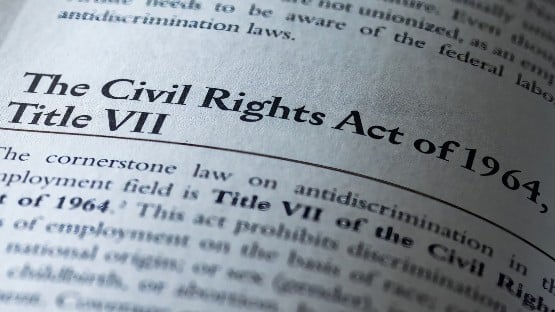
The Trump-packed Supreme Court, in another 6-3 ruling, is relegating the LGBTQ+ community to second-class status, siding with a Colorado web designer who cited religious objections for not wanting to have to create websites for same-sex weddings.
And you have to wonder about the more far-reaching implications of the ruling in the case, specifically related to the 1964 Civil Rights Act, which could very much be in jeopardy.
First, to the case decided on Friday, which, funny thing, the web designer, Lorie Smith, whose website company is named 303 Creative, hadn’t actually gotten a request from a same-sex couple to design a wedding website.
The request cited in the case was traced back to a Colorado man who is heterosexual and has been married for 15 years, and told The New Republic that he had no idea that his name had been used as part of the case.
You can imagine how the MAGAs would carry on with this if the tables were turned, can’t you?
Fake news!
Fake news or not, the ruling is real, and has real-world impacts.
Of note is how deafeningly quiet Virginia Republicans have been on the decision and its impacts.
Basically, nothing in the form of comment or recognition from Gov. Glenn Youngkin, who for some reason thinks he’s going to run for president next year, nothing from Lt. Gov. Winsome Earle-Sears or Attorney General Jason Miyares.
Nothing from Sixth District Congressman Ben Cline, nothing from Ninth District Congressman Morgan Griffith, nothing from Second District Congresswoman Jen Kiggans.
The sum total of what we got was one line from Fifth District Congressman Bob Good: “First Amendment for the win.”
That’s noticeably subdued for Good, one of the House Republican Caucus’s more vocal culture warriors.
And then there was one sorta, kinda, we had to say something, and this is the something line from the Republican Party of Virginia, referencing how the Supreme Court “affirms 1A Religious Liberty freedoms.”
The issue for Republicans is probably obvious. It’s the right that likes to bemoan the “slippery slope” when it comes to matters of judicial overreach, and the decision in the 303 Creative case clearly opens up a slippery slope for future lawsuits from people who will cite religious objections to having to serve people from different racial, ethnic and perhaps even political and philosophical backgrounds.
“We have to distinguish between free speech in terms of the creative expression and how one markets or makes their art available, and those that might violate other reasonable accommodation laws or laws that are already designed to prevent the scenario you just spoke about. So, there’ll be a discussion about where this leads,” CNN legal analyst Laura Coates said.
Which is to say, the door is clearly open to rolling back the 1964 Civil Rights Act, which, for the moment, prohibits discrimination in public accommodations on the basis of race, color, religion, sex and national origin.
“Every bigot, from a car mechanic to a ‘sandwich artist’ at Subway, will now have an opportunity to claim that their business is either ‘creative’ or a ‘speech act’ that cannot be subjected to normal anti-discrimination laws,” wrote Elie Mystal, the justice correspondent at The Nation, and the author of the New York Times bestseller Allow Me to Retort: A Black Guy’s Guide to the Constitution.
“Who will tell them they’re wrong?” Mystal wrote. “Who will stop a chef from arguing that their culinary concoctions can only be enjoyed by white people? Who will stop the carpenter who claims that woodworking is an artistic speech act and only white people deserve doors?
“Not Neil Gorsuch – he’s making this stuff up as he goes along. Not the Supreme Court – the conservatives want to make the world safe for bigots, not fair for everybody else,” Mystal wrote.
That’s down the road, probably not too far down the road, but still. In the here and now, the responses of Virginia Democrats to the decision in the 303 Creative case were largely limited to the impact on the LGBTQ+ community. Mark Warner and Tim Kaine, Democrats who serve in the U.S. Senate, both pledged to push for passage of the Equality Act to enshrine protections for LGBTQ+ Americans in federal law, though obviously, the Equality Act has no chance in the here and now with Republicans in control of the U.S. House.
The one recognition that there are more far-reaching implications to the 303 Creative decision came in a single line from Virginia Democratic Congressman Don Beyer, who noted what he termed the “very powerful opening” in Justice Sonia Sotomayor’s dissent: “Today, the Court, for the first time in its history, grants a business open to the public a constitutional right to refuse to serve members of a protected class.”
That’s where this is going, unfortunately.










